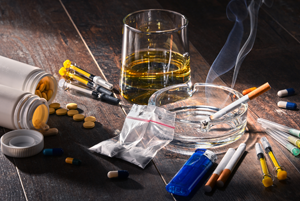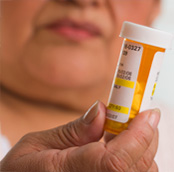Drug Offenses
 Over the past decade, growing awareness of the dangers of certain kinds of drugs, and an increased tolerance of others, have brought changes to the law. It can be difficult to navigate this shifting landscape, but since drug offenses remain some of the most harshly punished crimes, it is vital to know what acts and what types of substances are legally prohibited.
Over the past decade, growing awareness of the dangers of certain kinds of drugs, and an increased tolerance of others, have brought changes to the law. It can be difficult to navigate this shifting landscape, but since drug offenses remain some of the most harshly punished crimes, it is vital to know what acts and what types of substances are legally prohibited.
A “controlled substance” is any substance whose sale and use is governed by law, a definition that includes everything from LSD to Robitussin cough syrup. The government classifies these substances by schedules that correspond to each substance’s acceptable uses and potential for dependency. The drugs deemed most harmful, with the fewest potential benefits, are classified as Schedule 1 drugs, while drugs that are thought to have the greatest medical usefulness and smallest potential for abuse are Schedule 5 drugs.
Illegal Possession
Federal and state (and sometimes local) laws define possession of certain substances as illegal, but the definition of “illegal possession” varies depending on the substance, the amount, and the location. For example, in California, where recreational marijuana was legalized in 2016, an adult may possess up to 28.5 grams of dried flower cannabis. In contrast, Florida defines possession of more than 20 grams of marijuana for non-medical use as a felony, punishable by anywhere from one to 30 years of incarceration, depending on the quantity.
Even with all the variations from state to state, illegal possession laws generally have two common elements: the person in possession of the controlled substance must know that it is a controlled substance, and the person must actually possess the substance, that is, have control over it. But “illegal possession” is not limited to substances like marijuana and heroin. Other substances are criminalized under certain circumstances, as are materials associated with drug use.
- Possession of drug paraphernalia. Both federal law and state law restrict the possession or use of drug paraphernalia. Federal law makes it illegal to sell, mail, import, or export drug paraphernalia, while state laws may criminalize simple possession of these articles, which include bongs, roach clips, pipes, and spoons. Many of these items have alternative uses (e.g. smoking tobacco), so prosecutors may have to demonstrate that the items contain drug resin or show other evidence of illicit use.
- Illegal possession of prescription drugs. Illegal possession laws cover both substances that are sometimes or always illegal – marijuana, methamphetamines, cocaine, heroin, LSD – and substances that may be legally prescribed by a doctor, like Xanax, hydrocodone, Vicodin, codeine, etc., in the possession of someone without a valid prescription. Some state laws criminalize selling or sharing prescription drugs, and in some states, including Maine, it is illegal to carry a prescription drug outside of the original container.
Distribution and Trafficking
The terms “distribution” and “trafficking” refer generally to the same type of act. When comparing “distribution” and “trafficking,” there is a difference in degree rather than kind. Distribution involves selling, transporting, or generally providing controlled substances. This action rises to the level of “trafficking” if larger quantities of drugs are involved; the drugs don’t have to move from one state to another, nor do the drugs need to have changed hands. The ensuing penalties depend on the type and amount of drugs involved.
Also, if an individual is caught with an amount of drugs deemed too large for personal use, that individual can be charged with “intent to distribute.” A prosecutor also can establish intent to distribute by presenting a witness to a drug deal or by showing the presence of drug paraphernalia like scales or packaging, or messages between people suggesting that they were interested in purchasing or selling drugs.
Manufacturing or Cultivating Proscribed Substances
Drug manufacturing includes any activity that leads to the production of controlled substances. While the term “manufacturing” may call to mind images of the mobile meth lab in Breaking Bad, manufacturing encompasses a wide range of activities, including the sale of chemicals or equipment needed to make controlled substances. However, sellers of such preliminary goods can be held liable for manufacturing only if they knew or had reason to know that the buyer planned to use those goods to make drugs.
For purposes of federal law, cultivation of opium or hallucinogenic plants (e.g. hallucinogenic mushrooms) is proscribed and punished like manufacturing.
Marijuana Legalization
The enforcement (and understanding) of drug laws has been complicated by a spate of state laws legalizing marijuana for both medical and recreational use. As of January, 2023, 37 states and the District of Columbia made some provision for access to medical marijuana; 21 of those states and the District of Columbia also permit recreational use. In states that permit medical marijuana sales, the drug may be sold through medical dispensaries or, in some instances, cultivated at home. Where recreational marijuana is allowed, it’s generally sold through private businesses and may be cultivated at home in small amounts. The sale of marijuana outside of regulated and approved legal channels remains illegal.
Eight states where recreational marijuana is not legal, including Hawaii, Minnesota, Louisiana, and Ohio, have decriminalized marijuana, which means no one can be arrested, imprisoned, or receive a criminal record for possession of small amounts of marijuana. However, decriminalization only addresses possession. These eight states still ban the sale of marijuana, which means that users have no legal source for the drug.
The picture is complicated by the fact that marijuana remains illegal under federal law. Federal law continues to define marijuana as a Schedule 1 drug; however, the Biden administration discourages enforcement of federal marijuana laws and is taking steps to decriminalize possession and use of marijuana at the federal level. For more details on understanding current marijuana laws, please visit our page on that topic.
Connect with Top-rated Attorneys Near You
Sponsored Advertisement
Latest Article
The Exclusionary Rule: Definition, Examples, and Impact
What Is the Exclusionary Rule? What Are Common Situations Where It Applies? Are There Exceptions? How Has It Changed Cri... Read More
Lying Under Oath: The True Penalty for Perjury
What Is Perjury? What Must the Prosecutor Prove? What Are the Penalties? In the legal system, oral and written testimon... Read More
Protective Order vs. Restraining Order
What Is a Protective Order? What Is a Restraining Order? When Are They Commonly Used? You've been a victim of domestic ... Read More
GETLEGAL®ATTORNEY DIRECTORY
Find Leading Attorneys in Your Area
NEED PROFESSIONAL HELP?
Talk to an Attorney
How It Works
- Briefly tell us about your case
- Provide your contact information
- Choose attorneys to contact you





